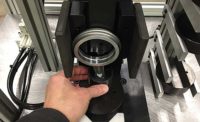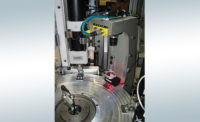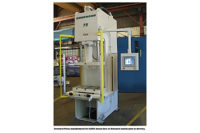Makers of printed circuit boards aren’t the only manufacturers interested in packing more power into a smaller space. Companies that make plug connectors are also focused on producing smaller products that accommodate more power and have a higher contact density.
Portsmouth, United Kingdom-based Harwin Plc is one such manufacturer. In 2016, the company updated its Gecko Screw-Lok connector series for the consumer electronics, automotive, aerospace and motor sports industries.
These connectors provide a reliable screw connection in many mating applications, have a pin pitch of only 0.05 inch, and are half the size and 75 percent lighter than typical micro D connectors. They operate in temperatures from -85 F to 302 F and can also withstand severe vibration.
Paul McGuinness, operations director at Harwin, says that, initially, the upgraded connectors were assembled manually due to their varying number of pins (4 to 50) and numerous mounting options. As demand increased, however, manual assembly became unsustainable in terms of cost and the limited number that could be produced by hand.
This situation led Harwin engineers to collaborate with those at Festo Corp., an automation partner, and develop an automated solution flexible enough to handle all connector variations in the Screw-Lok series. The short assembly line consists of three integrated stations that perform pin positioning, press-fitting and bending.
Each station has a Festo YXMx handling system, which features an EXCM gantry robot that performs the X-Y axis positioning of workpiece carriers and plastic connector housings. All electric and pneumatic grippers and actuators are actuated by the system’s CECC-X controller.
At the first station, several housings are firmly set in a workpiece carrier, and pins are positioned into each housing. The carrier is then moved to directly below a Festo YJKP servo press in the second station. Software in the press controls ram movement along the Z axis during pin insertion into each housing. Force detection and a motion controller further ensure accurate press fitting. The software then determines whether the press-fit pins are within tolerance.
Acceptable housings are moved to the third station, where its handling system and servo press, in coordination, carefully bend the inserted contact pins to the required angle. Operators use the system’s HMI to quickly and easily upload the correct press profile for each pin variation.
“This three-station solution ensures low production costs and high reliability, precision, repetition accuracy and flexibility,” says McGuinness. “These systems enable maximum standardization and modularization, as standard parts are used everywhere. This makes commissioning and maintenance easier.”
Other capabilities of the YXMx system include screwdriving, dispensing, testing, soldering, and opening and closing containers. Stroke length of the EXCM robot is scalable from 90 to 700 millimeters on the X axis and 110 to 510 millimeters on the Y axis. A USB remote camera is optional.
Software in the YJKP press allows for real-time monitoring of key parameters—such as force, displacement and speed—during press-fitting, joining, swiveling and other assembly processes. Force ranges from 0.8 to 17 kilonewtons. Stroke length is 100 to 400 millimeters.
For more information on servo presses and material handling systems, call 631-435-0800 or visit www.festo.com.







